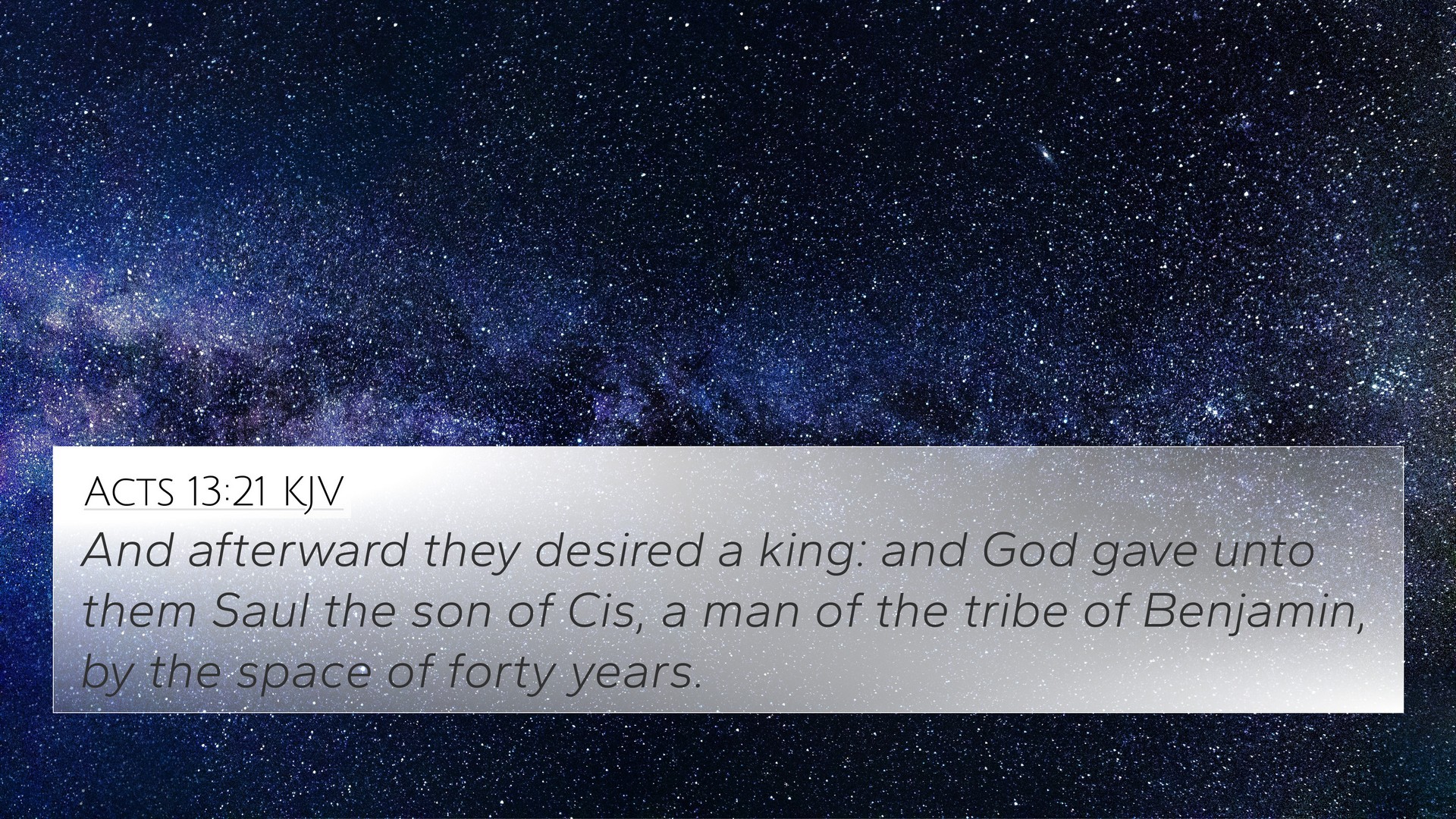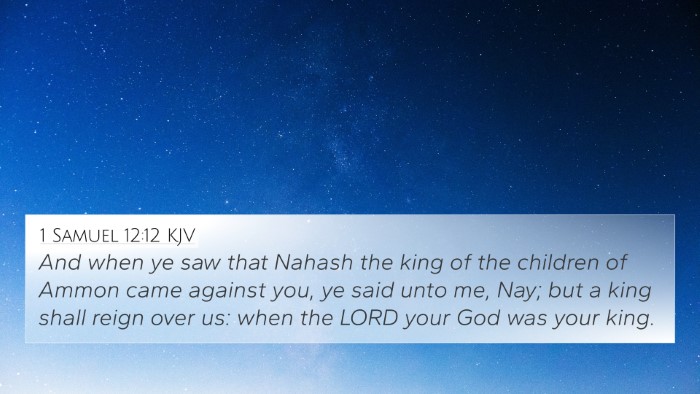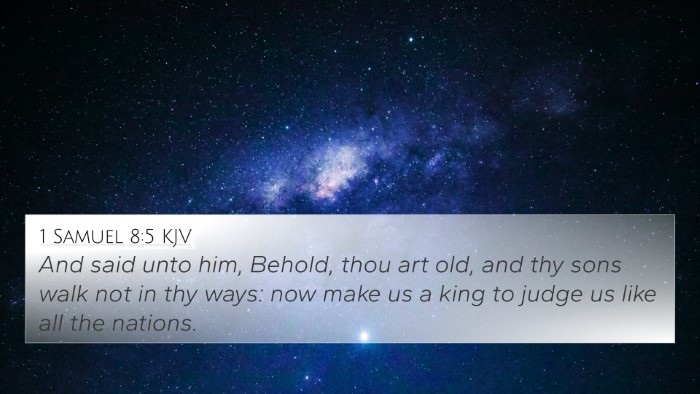Understanding Acts 13:21
Acts 13:21 states: "And afterward they asked for a king; so God gave them Saul, the son of Kish, a man of the tribe of Benjamin, for forty years."
Overview of the Verse
This verse references a significant period in Israel's history where the people requested a monarchy, rejecting God’s direct leadership. God granted their request, leading to the appointment of Saul, marking a transition from the period of judges to monarchy.
Commentary Insights
Matthew Henry's Commentary: Henry describes this request as a pivotal moment where the Israelites chose a king to rule over them, which demonstrated their desire to be like other nations. It reflects their lack of trust in God's sovereignty. Henry emphasizes that God, in His wisdom, allowed this request but also points out the eventual troubles that arose from this decision.
Albert Barnes' Notes: Barnes points out that the request for a king indicated a rejection of God's rule. He elaborates on how Saul’s anointing was God's response to the people’s demand but notes that this was not without consequences. Barnes highlights that while Saul was acceptable for a time, the folly of this decision would soon lead to discord and disaster within the nation.
Adam Clarke's Commentary: Clarke focuses on the implication of being given a king, pointing to the divine permissiveness in God’s response. He stresses that while Saul was chosen for his stature and capabilities, the appointment was also a significant lesson about the nature of human desires versus divine will. Clarke observes that the Israelites underestimated the complexity of having an earthly monarch.
Thematic Connections and Cross-References
The events in Acts 13:21 connect to several themes throughout the Bible. Here are some relevant cross-references:
- 1 Samuel 8:5 - The Israelites request a king, showing their desire to have a leader like surrounding nations.
- 1 Samuel 9:1-2 - Introduction to Saul, describing his physical attributes and noble lineage.
- Deuteronomy 17:14-15 - God provides guidelines for kingship in Israel, presciently addressing the people's future desires.
- 1 Samuel 10:1 - Samuel anoints Saul, confirming God's choice amidst the people’s demands.
- 1 Samuel 13:13-14 - The decline of Saul’s kingship, foretold by Samuel, indicating the consequences of rejecting God's direct rule.
- Acts 7:51-53 - Stephen highlights Israel’s repeated rejection of God’s leaders, echoing the sentiment in Acts 13:21.
- Matthew 23:37 - Jesus laments over Jerusalem, drawing parallels to the rejection experienced throughout Israel’s history.
- 1 Chronicles 10:13-14 - God's disapproval of Saul’s kingship due to his disobedience, further assessing the implications of their choice.
- Romans 13:1-2 - The New Testament reflects on authority and God’s sovereignty, providing a framework for understanding leadership.
- Philippians 2:10-11 - Ultimately, every authority returns to acknowledge God, contrasting the Israelite request for a human king.
Lessons from Acts 13:21
The story of Israel's demand for a king carries profound lessons. These lessons include:
- The Nature of Human Leadership: Human leaders can be flawed, and desires for earthly authority should always be tempered with divine guidance.
- Consequences of Disobedience: Israel’s request led to a monarchy that ultimately caused strife, underscoring the dangers of prioritizing human judgment over divine wisdom.
- God’s Sovereignty: Even in granting their desires, God remained in control and had a purpose for Saul’s rise and fall.
- Importance of Trust: The need for trust in God rather than seeking external validation through earthly structures is emphasized in this narrative.
- Historical Reflection: Reflecting on history can provide insight into the cyclical nature of human choices and divine responses.
Applications for We Today
Believers today can apply the insights of Acts 13:21 in various ways:
- Seeking God’s Will: It encourages us to seek God’s will rather than rush into decisions based solely on outside pressures.
- Understanding Authority: Learning the balance between acknowledging human authority while remaining obedient to God's ultimate authority is critical.
- Prayer for Leaders: It highlights the importance of prayer for leaders to ensure they lead in alignment with God’s purpose.
- Reflecting on Our Choices: This passage invites introspection on our life choices and whether they align with God’s desires.
- Community Listening: It serves as a reminder of the value of collective spiritual discernment within communities of faith.
Conclusion
Acts 13:21 is not merely a recounting of history but serves as a crucial text for understanding the intersection of divine authority and human desire. Through a careful examination of this verse, along with its cross-references, we can glean insights into our spiritual journey, the nature of leadership, and our relationship with God. The thematic connections drawn from this passage reflect the richness of Scripture and encourage deeper study of related verses.
Further Study and Reflection
For those wishing to delve deeper into the connections between biblical texts, utilizing tools for Bible cross-referencing can enhance understanding. Reflecting on cross-references not only illuminates the historical context but also reveals thematic connections throughout Scripture, fostering a richer faith experience.








